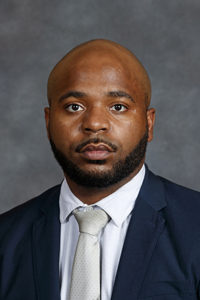Bill gutted to become inland port authority measure, advanced
Lawmakers gave first-round approval March 26 to a proposal intended to give community members greater say in the development of a proposed inland port district in Omaha.

As introduced by Omaha Sen. Terrell McKinney, LB164 would have updated building and energy codes in state law. An Urban Affairs Committee amendment, adopted 32-0, replaced the bill with a separate proposal to change the Municipal Inland Port Authority Act, which the Legislature created in 2021.
It allows qualifying cities and counties to create an inland port authority — administered by an appointed governing board — with the power to plan and develop an inland port district. Up to five inland port districts may be designated throughout the state.
Among other changes, the amendment would increase that number to seven and allow no more than one district to be created in a metropolitan class city. Omaha currently is the state’s only metropolitan class city.
McKinney introduced an amendment, adopted 30-0, that would replace the committee amendment with a modified version of the proposal, leaving the maximum number of districts at five.
He said the changes are intended to ensure that a proposed business park and innovation district in North Omaha are developed with public input.
“We’re just trying to make sure that there is proper coordination with the projects and that … the community isn’t forgotten about,” McKinney said.
The amendment would require an inland port authority within the boundaries of a metropolitan class city to create and operate an innovation district, conduct quarterly public input meetings, create and maintain a community advisory committee and meet several other requirements.
McKinney’s amendment also would require the state treasurer to transfer $30 million from the Economic Recovery Contingency Fund to a proposed Inland Port Authority Fund for the innovation district and other purposes. That funding currently is designated for grants to a proposed innovation hub in North Omaha.
In addition to that transfer, the treasurer would transfer interest earned from federal coronavirus relief funds, as well as investment earnings from funds designated for the construction of a new state prison, to the Inland Port Authority Fund for the next two fiscal years.
The treasurer would use the new fund to provide grants to an inland port authority created within the boundaries of a metropolitan class city.
The amendment also would require the state Department of Economic Development to meet certain requirements before releasing approximately $90 million in grant funds it recently awarded to a nonprofit to develop the North Omaha business park.
Before releasing the funds, the department would require the grant recipient to attend all meetings of the proposed advisory committee and establish a separate bank account for the funds.
The recipient also would have to submit a financial pro forma, hold two public meetings to receive input on economic development initiatives within the business park and receive a letter of support from the inland port authority managing the inland port district where the park is located.
Additionally, McKinney’s amendment would require the state treasurer to transfer $7 million from the Economic Recovery Contingency Fund to the Museum Construction and Maintenance Fund for the construction of a new museum at Fort Robinson State Park.
The amendment also would create two grant programs intended to increase Nebraska’s child care capacity.
Under the first program, the state Department of Economic Development would award grants to cities, villages, counties, nonprofits and other eligible recipients identified by a statewide organization that supports children and families.
Applicants would be required to provide a one-to-one match before receiving a grant. They could use the funds to provide financial support to a licensed child care program or a license-exempt provider serving children enrolled in a child care subsidy program, among several other uses.
Under the second program, the department would provide grants for certain new and existing licensed family child care programs and to create regional hubs that would provide administrative and technical support to those programs.
Senators voted 31-0 to advance LB164 to select file.

